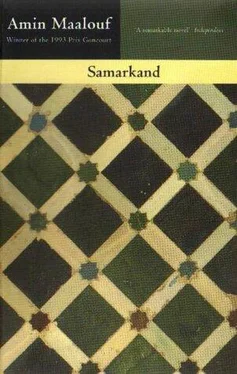I could only confess my total ignorance.
‘When Egypt rose up against the English,’ Rochefort continued, ‘it was at this man’s call. All the intellectuals of the Nile Valley take their inspiration from him. They call him ‘Master’ and revere his name. However, he is not an Egyptian and has only made a short stay in that country. He was exiled to India where he managed to arouse a considerable movement of opinion. Under his influence newspapers were established and associations were formed. The Viceroy became alarmed and had Jamaladin expelled, whence he decided to settle down in Europe and he continued his incredible activity in London and then in France.’
‘He worked regularly on l’ Intransigeant and we used to meet often. He presented his disciples to me — Muslims from India, Jews from Egypt and Maronites from Syria. I believe that I was his closest French friend, but certainly not the only one. Ernest Renan and Georges Clemenceau knew him well, and in England his friends were people like Lord Salisbury, Randolph Churchill or Wilfrid Blunt. A little before his death, Victor Hugo met him too.’
‘This very morning, I was in the middle of going over some notes about him which I am thinking of inserting in my memoirs.’
Rochefort took some sheets covered in minuscule writing out of a drawer and read: ‘I was introduced to an outlaw, a man famous throughout all of Islam as a reformer and a revolutionary — Sheikh Jamaladin, a man with the head of a saint. His beautiful black eyes, so gentle and yet fiery and his deep tawny beard which reached his chest gave him a particularly majestic air. He looked like a born leader. He understood French more or less although he could hardly speak it, but his ever alert intelligence easily made up for what he lacked of our language. Behind his calm and serene appearance his activity was frenetic. We soon became good friends for my spirit is instinctively that of a revolutionary and I am attracted to all freedom-fighters …’
He quickly put the sheets of paper away and then continued:
‘Jamaladin had rented a small room on the top floor of a hotel in Rue de Sèze near the Madeleine. That modest space was enough for him to edit a newspaper which went off by the bundle to India and Arabia. I only managed to wheedle my way into his den once, being curious to see what it could look like. I had invited Jamaladin to dine chez Durand and promised to go by and pick him up. I went straight up to his room. It was difficult to move around in it because of all the newspapers and books piled up to the ceiling there, some of them even covering the bed. There was a suffocating smell of cigar smoke.’
In spite of his admiration for him, he had pronounced this last phrase with a hint of distaste, which induced me to extinguish on the spot my own cigar which was an elegant Havana I had just lit. Rochefort thanked me for that with a smile and carried on:
‘After apologizing for the mess in which he was receiving me, and which, he said, was unbefitting for someone of my rank, Jamaladin showed me that day some books he was fond of — particularly that of Khayyam which was full of exquisite miniatures. He explained to me that this work was called the Samarkand Manuscript , and that it contained the quatrains which had been written in the poet’s own hand, together with a chronicle running in the margins. Above all he told me through what tortuous route the Manuscript had reached him.’
‘Good Lord!’
My pious English interjection draw a triumphal laugh out of cousin Henri. It was the proof that my cold scepticism had been swept away and that I would henceforth hang on to his every word and he lost no time in taking advantage of this.
‘Of course, I do not remember everything that Jamaladin must have said to me,’ he added cruelly. That evening we spoke mainly of the Sudan. After that I never saw the Manuscript again but I can testify that it existed, but I am truly afraid that by now it has been lost. Everything my friend possessed was burned, destroyed or scattered around.’
‘Even the Khayyam Manuscript?’
By way of reply, Rochefort made a discouraging pout, before throwing himself into an impassioned explanation during which he made close reference to his notes:
‘When the Shah came to Europe to go to the World Fair in 1889, he suggested to Jamaladin that he returned to Persia “instead of passing the rest of his life in the midst of infidels”, giving him to understand that he would install him in high office. The exile set some conditions: that a constitution be promulgated, that elections be organized, that equality be recognized by law ‘as in civilized countries’ and that the hugh concessions granted to the foreign powers be abolished. It must be stated that in this area the situation of Persia had for years been the butt of our cartoonist: the Russians, who already had a monopoly on road-building, had just taken over military training. He had formed a brigade of Cossacks, the best equipped in the Persian army, which was directly commanded by officers of the Tsar; by way of compensation, the English had obtained, for a song, the right to exploit all the country’s mineral and forest resources as well as to manage the banking system; as for the Austrians — they had control of the postal services. In demanding that the monarch put an end to royal absolutism and to the foreign concessions, Jamaladin was convinced that he would receive a rebuff. However, to his great surprise, the Shah accepted all his conditions and promised to open up the country to modernisation.
‘Jamaladin thus went and settled in Persia, as part of the sovereign’s entourage. The sovereign, at the start, showed him all due respect and went as far as to introduce him with great ceremony to the women of his harem. However, the reforms were put off. As for a constitution, the religious chiefs persuaded that Shah that it would be against the Law of God, and courtiers foresaw that elections would allow their absolute authority to be challenged and that they would end up like Louis XVI. The foreign concessions? Far from abolishing those which existed, the monarch, ever short of money, was to contract new ones: for the modest sum of fifteen thousand pounds sterling he granted an English company the monopoly of Persian tobacco — not only its export but also domestic consumption. In a country where every man, every woman and a good number of children were addicted to the pleasures of the cigarette or the pipe, this was a most profitable business.
‘Before news of this last renunciation of Persian rights was announced in Teheran, pamphlets were distributed in secret advising the Shah to rescind his decision. A copy was even placed in the monarch’s bedroom, and he suspected Jamaladin of being the author. The reformer, who was by now worried, decided to go into a state of passive rebellion. This is a custom practised in Persia: when a person fears for his liberty or his life, he withdraws to an old sanctuary near Teheran, locks himself in there and receives visitors to whom he lists his grievances. No one is allowed to cross through the doorway to lay hold of him. That is what Jamaladin did and thereby provoked a surge of people. Thousands of men streaming from all corners of Persia to hear him.
‘In a state of vexation the Shah gave orders for him to be dislodged. It was reported that he hesitated a long time before committing this felony, but his vizir, who was educated in Europe moreover, convinced him that Jamaladin had no right to claim sanctuary since he was only a philosopher and a notorious infidel. Armed soldiers broke into the holy place, cleared a passage through the numerous visitors and seized Jamaladin, whom they stripped of everything he possessed before dragging him half-naked to the border.
Читать дальше












